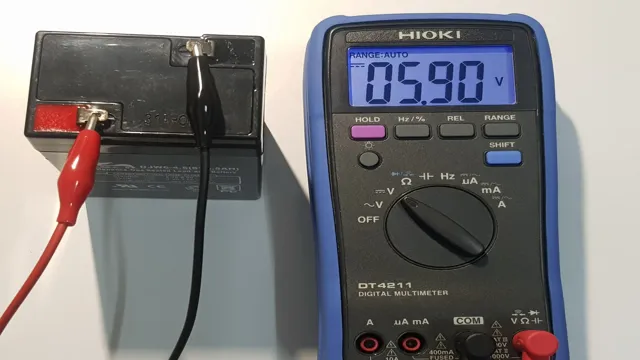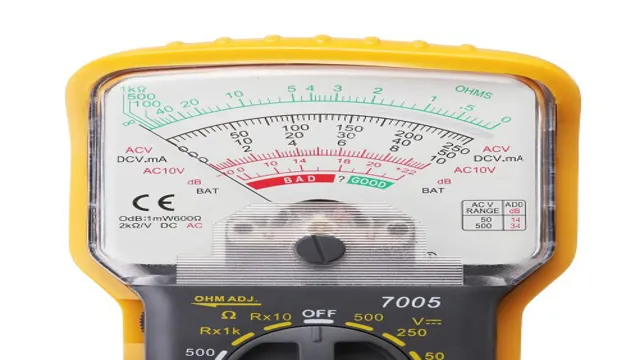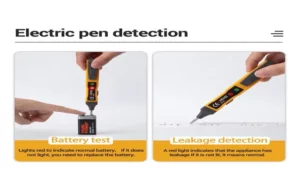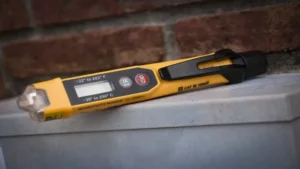Are you a DIY enthusiast and in need of a tool to measure the electrical current in your circuits? Multimeters and voltage testers are two common tools that electricians and hobbyists commonly use. However, which one is better suited for your specific needs? Both devices can measure voltage, but there are significant differences that you should know before making a purchase. Through this blog, we will compare and contrast multimeters and voltage testers to help you make an informed decision that best fits your job.
So, grab a cup of coffee and read on!
What is a Multimeter?
Many people often confuse a multimeter with a voltage tester, but they are not exactly the same thing. While both tools are used to measure electrical currents, a multimeter is a more versatile device that can measure a range of electrical properties, such as voltage, resistance, and amperage. On the other hand, a voltage tester is designed to detect if there is any voltage present in an electrical system, typically indicating whether or not it is safe to work on.
Essentially, a multimeter is a more comprehensive tool that can provide more detailed information about an electrical system, while a voltage tester is more of a quick indicator of the presence of electricity. So, to answer the question, a multimeter is not the same as a voltage tester, but rather a more robust and versatile tool.
Definition and Functions
A multimeter is a versatile instrument used by electricians and technicians to measure several electrical properties. It is a handheld device with probes at one end and a display screen at the other. A multimeter can measure voltage, current, resistance, and continuity, making it a go-to tool for testing and diagnosing electrical systems.
Furthermore, it can also detect faults and breakdowns in electronic devices and appliances. Using a multimeter can help you quickly diagnose and fix faults, saving time and effort. For example, if a circuit is not working correctly, a multimeter can be used to measure the voltage supply and identify any faults in the circuit.
With its straightforward design and easy-to-read interface, even novice operators can use a multimeter to help diagnose and fix electric faults. Overall, a multimeter is a must-have instrument for anyone working with electricity.

Types of Multimeters
A multimeter is an essential tool for anyone who works with electrical circuits. It allows you to measure various electrical parameters, such as voltage, current, and resistance. However, not all multimeters are created equal, and depending on your needs, you might need a different type of multimeter.
There are mainly three types of multimeters: analog, digital, and clamp. Analog multimeters are the oldest type, and they use a needle to indicate the value of the measured parameter. They are often inexpensive, but they can be hard to read, and accuracy can be compromised if the needle is not calibrated correctly.
Digital multimeters, on the other hand, use a digital display to show the measured value. They are more expensive than analog meters, but they offer greater accuracy and precision. Digital meters also include additional features, such as auto-ranging, which adjusts the range of measurement automatically.
Finally, clamp meters are specialized multimeters that allow you to measure current without breaking the circuit. Instead, you clamp the meter around the conductor, and it measures the magnetic field around it to determine the current. These meters are ideal for measuring current on high-powered circuits.
In conclusion, when choosing a multimeter, consider what parameters you need to measure, the accuracy you require, and your budget. Whether you choose an analog, digital, or clamp meter, make sure it fits your needs, and always follow safety guidelines when working with electricity.
What is a Voltage Tester?
Many people often confuse a multimeter with a voltage tester, but they are two different tools used for electrical testing. While a multimeter can measure voltage, resistance, and current, a voltage tester is specifically designed to detect the presence of electrical energy in a wire or circuit. A voltage tester is a simple and quick tool that helps verify if a wire or a device is live, and it can be a lifesaver when working with electricity.
Unlike multimeters, voltage testers only check for the presence of electrical energy and do not provide a numerical reading of the voltage level. Therefore, if you want to measure the exact voltage of a circuit, a multimeter is the right tool for the job. So, it’s important to understand the difference between the two and use the appropriate tool for the task at hand.
Definition and Functions
A voltage tester is an essential tool that electricians frequently use to check electrical circuits for electricity. Simply put, it’s a device used to measure voltage levels in electric circuits. It’s an inexpensive and easy-to-use tool that can detect the presence of electrical power, identify blown fuses, and even determine if a switch is functioning correctly.
The voltage tester consists of a few basic components, including two probes and an indicator light. The probes are used to make contact with the electrical circuit, and the indicator light shows whether there’s electrical power flowing through it. This device is beneficial in identifying faults in electrical circuits and ensuring that the voltage levels are precise and within specifications.
In summary, a voltage tester is an essential tool for anyone working with electrical systems, providing a safe and efficient way to test circuits, outlets, and switches.
Types of Voltage Testers
A voltage tester is a tool used for measuring the amount of electrical voltage present in a circuit or device. They come in various types, each with their own specific uses and methods of operation. The most basic type of voltage tester is a non-contact tester, which is used to check the presence of voltage in a wire without actually making contact.
This type of tester is easy to use and can be used for quick screening purposes. Another type of voltage tester is the contact tester, which is used to measure the actual amount of voltage present in a circuit by directly contacting the wire or device with the tester’s test leads. This type of tester requires a bit more skill to use, but provides more accurate results.
Additionally, there are specialized voltage testers designed for specific applications, such as continuity testers, which can be used to test for breaks in a circuit, and clamp meters, which can measure the amount of current flowing through a wire. Overall, voltage testers are an essential tool for anyone working with electrical circuits, and selecting the right type for a particular task is crucial for ensuring accurate and safe measurements.
Differences between a Multimeter and Voltage Tester
Many people often wonder if a multimeter is the same as a voltage tester. While they both have the ability to measure electrical potential, there are some differences between the two tools. A multimeter is a device that can measure several different electrical properties, including voltage, current, and resistance.
It usually has a digital display that shows the measured values and can be used for troubleshooting and diagnosing electrical problems. On the other hand, a voltage tester is a simpler device that is mainly used to test if there is voltage present in a circuit. It usually has a light or sound indicator that signals the presence of voltage.
One of the key differences between a multimeter and a voltage tester is their versatility. A multimeter can measure multiple properties, whereas a voltage tester is limited to measuring voltage only. Additionally, a multimeter is a more sophisticated testing tool that requires some level of technical expertise to operate, while a voltage tester is more straightforward and easier to use.
In summary, while a multimeter and a voltage tester can both measure electrical potential, they are not the same tool. If you are conducting more complex electrical work, a multimeter might be more appropriate. However, if you simply need to check for the presence of voltage, a voltage tester will get the job done.
Functionality and Features
When it comes to electrical tools, there are many options to choose from. Two common tools used to measure voltage are multimeters and voltage testers. While they may seem similar at first glance, there are several key differences between them.
A multimeter is a versatile tool that can measure voltage, current, and resistance. It typically has a digital display and various settings for different types of measurements. A voltage tester, on the other hand, is a simpler tool that only measures voltage.
It often has a basic display, such as a light or sound indicator, to show the presence and strength of voltage. Another difference is the range of voltages each tool can measure. A multimeter can typically measure a wider range of voltages, from small values like millivolts to larger values like thousands of volts.
A voltage tester may only be able to measure a specific range of voltages, such as up to 600 volts. In summary, while both multimeters and voltage testers can be used to measure voltage, a multimeter offers greater versatility and a wider range of measurements. However, if you only need to measure voltage and want a simpler tool with a lower price point, a voltage tester may be a better option for you.
Cost and Availability
When it comes to measuring electricity, two common tools are the multimeter and voltage tester. While both tools are designed to measure electrical voltage, they have some important differences to consider. One key difference is cost- a multimeter tends to be more expensive than a voltage tester, as it is a more versatile tool capable of performing a wider range of tests.
However, a voltage tester may be more readily available and easier for beginners to use. Yet, one should consider what type of measurements they will need to make before selecting a tool. A voltage tester is ideal for identifying whether or not an outlet or circuit is live, while a multimeter can provide more detailed readings such as voltage, resistance, and current.
Ultimately, the best tool for the job depends on the specific needs and level of expertise of the user.
Which One to Use?
Are a multimeter and a voltage tester the same thing? While they both serve similar purposes in electrical work, there are some key differences between the two tools. A multimeter is a versatile device that can measure a variety of electrical values, including voltage, current, and resistance. It typically consists of a dial or screen that allows the user to select the type of measurement they want to take, as well as probes or clamps for connecting to the circuit.
In contrast, a voltage tester is typically a simpler tool that is designed specifically for checking voltage levels. It may consist of a light or audible indicator that illuminates or sounds when voltage is present, or it may be a more advanced device that can measure the exact voltage level. Ultimately, the choice between a multimeter and a voltage tester depends on the specific needs of the user and the task at hand.
For more complex electrical work, a multimeter may be the better option, while a voltage tester is a quick and convenient tool for basic voltage testing. Regardless of which tool you choose, it’s important to use it properly and safely to avoid any accidents or damage to the circuit.
Choosing the Right Tool for Your Needs
When it comes to choosing the right tool for your needs, the most important thing is to understand what specific problem you’re trying to solve. Whether you’re looking for a new piece of software, a new piece of hardware, or just a new approach to your work, it’s essential to understand what you’re trying to achieve and what tools are available to help you. One keyword that can guide you in this process is “versatility”.
A tool that is versatile will allow you to approach different tasks in different ways, while a more specialized tool might be better suited to a specific task. However, it’s worth considering that sometimes a specific tool might be more efficient or effective than a versatile tool that can do many things. It all depends on your specific needs and the resources available to you.
Ultimately, the key to choosing the right tool for your needs is to do your research, ask questions, and be willing to experiment until you find the right fit.
Conclusion
In conclusion, comparing a multimeter to a voltage tester is like comparing a Swiss Army Knife to a basic pocket knife. While both may have a blade, a Swiss Army Knife offers a plethora of tools at your fingertips to tackle a variety of tasks. Similarly, a multimeter not only measures voltage, but also current, resistance and sometimes even capacitance and frequency, making it a versatile tool for electrical work.
So while a voltage tester may be handy for a quick check, a multimeter is truly the electrician’s Swiss Army Knife.”
FAQs
What is a multimeter used for?
A multimeter is a versatile tool used to measure voltage, current, and resistance of an electrical circuit.
Can a voltage tester be used as a substitute for a multimeter?
No, a voltage tester can only detect the presence of voltage in an electrical circuit, while a multimeter can measure multiple aspects of the circuit.
What are the different types of multimeters?
There are two main types of multimeters: analog and digital. Analog multimeters use a needle to indicate readings, while digital multimeters display results on a digital screen.
How accurate are multimeters?
The accuracy of a multimeter varies depending on its quality and price range. However, most multimeters have a range of accuracy between 0.1% to 2%.
What types of electrical circuits can be tested with a multimeter?
A multimeter can be used to test various types of circuits, including AC/DC voltage circuits, current circuits, and resistance circuits.
How should a multimeter be stored and maintained?
A multimeter should be stored in a dry, cool place away from direct sunlight and kept clean from debris. The probes should also be regularly checked for damage and replaced if necessary.
What safety precautions should be taken while using a multimeter?
Safety precautions include wearing rubber-soled shoes, avoiding contact with live wires, and ensuring that the multimeter is set to the correct mode before use. It’s also important to keep the hands dry and away from the probes when taking measurements.






